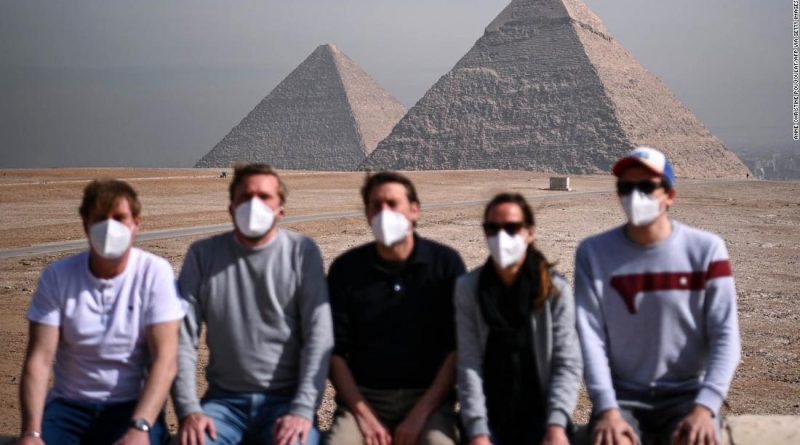Post-pandemic travel: What will it look like when the pandemic is over?
As the world ground to a halt last March, many travelers expected to be globetrotting again in a few months time.
Here we are just over a year later.
But with the rapid development of effective vaccines and increased distribution of those life-saving doses in some countries, glimmers of hope are starting to emerge.
The US Centers for Disease Control and Prevention is still urging against travel, but vaccinated travelers have reason to be optimistic.
“We’re revisiting what we should do regarding travel for those who are vaccinated and that should be coming forward soon,” agency director Dr. Rochelle Walensky said Thursday during a Senate hearing.
Travelers freely roaming the world again will find an experience shaped and changed by the pandemic — and not just in the mask wearing, social distancing and enhanced hygiene that we’ve come to expect in our daily lives.
Some of the changes are likely to last well beyond the pandemic’s end. CNN Travel asked a range of travel experts how the landscape will have shifted for consumers as the threat of Covid-19 recedes.
Here’s some of what to expect:
Vaccine and testing certificates popping up everywhere
Anyone with international travel aspirations will spend a significant amount of time studying the rules — both for entering another country and for returning to their own.
Hopefully, vaccinations will ease some of the hassle of navigating the current global patchwork of regulations.
But we’re going to need proof that we’ve been vaccinated, which brings us to what’s likely to be a hallmark of travel in the post-Covid era: vaccination and testing certificates, often referred to as “vaccine passports” or “health passports.”
The European Commission recently proposed Digital Green Certificates showing that a person has been vaccinated, received a negative Covid-19 test result or recovered from infection. The certificates would facilitate movement for EU citizens within the EU.
There are also a growing number of health apps designed to serve the same purpose in other places, including Travel Pass from the International Air Transport Association, Clear’s Health Pass and CommonPass. Some airlines are already testing health apps on select routes.
How this mushrooming collection of digital certifications will work across borders is still being determined.
Load Error
Most industry leaders agree that vaccination should not be a requirement to travel in part because people in many areas of the world are a long way from being vaccinated.
Widespread testing remains key, said Paul Charles, founder and CEO of London-based travel consultancy The PC Agency.
“Testing is the magic wand, as well as the vaccine. And only by testing travelers as much as possible can you reduce the impact of infections across borders,” Charles said.
But certificates for vaccinations and test results are likely to be carried by many travelers in the near future.
Ubiquitous touchless technology
Technology that was in use sporadically — like mobile hotel check-in — has become essential during this touch- and contact-averse time, and it won’t be going away anytime soon.
“Using your phone as a key, texting the front desk, texting room service — all of this was sort of starting to happen but is now so much wider spread,” said Jan Freitag, national director for hospitality analytics at hospitality analysis firm STR.
Even before the pandemic, cruise lines were adding tools such as facial recognition to help with the boarding process and touchless, contactless purchasing and entry to cabins, said Colleen McDaniel, editor in chief of cruising site Cruise Critic.
“I think now passengers are really going to see the benefit of that. We’ve all got used to not touching, not having a lot of face-to-face time with people,” she said.
It means more seamless embarkation and disembarkation as well as a much easier way to perform contact tracing, when necessary.
It’s not just technology that has become touchless, she added. “I don’t think the buffet as we knew it pre-Covid is going to come back.”
Casual buffet options will still be available, but food will be served by crew members, cutting down on touch points and food waste.
More out-of-the-way, independent lodging
Vacation rentals available through Airbnb and other sites have been especially popular during the pandemic with guests craving space and control.
It’s a trend that Freitag didn’t see coming. He expected guests to rely on the enhanced and standardized Covid-related cleaning and sanitation protocols available through major hotel brands.
“I did not think it would happen the way it happened, but it turns out that people prefer having their own front door, no lobby, no elevator and a place that they could Lysol down twice a day, if they want to,” he said.
Hotel demand and occupancy will go up again as people get more comfortable with hotel stays, he said.
In 2020, US hotel occupancy for the week ending on March 21 was just 30%. This year, occupancy was at 52% for the week ending March 13.
Room rates will continue to be lower. Rates dropped by 20% in 2020, Freitag said, and they’re only expected to rise by 4% this year.
Christopher Anderson, a professor at the Cornell School of Hotel Administration, said alternative lodging will continue to be a “bright spot” in the lodging space.
“I expect even in a fully vaccinated world people are going to look for newer and different types of experiences,” he said.
Many smaller, out-of-the-way properties — often independent hotels — had a great summer in 2020, he said.
“I think this will continue through 2021 as people continue to be cautious until we know more about the longevity of vaccination effectiveness,” Anderson said.
A reluctance to stay in city centers and downtown hotels may mean the emergence of exciting smaller hotels and restaurants in a city’s outer areas and suburbs, Paul said.
More flexibility, for now
Travel policies have become more flexible and that may outlast the pandemic, some experts say.
“One of the great things that has emerged is travel providers, tour operators and airlines becoming more flexible,” said Charles. “They’ve obviously been forced to be more flexible, if they want to keep their customers in the future, but it’s definitely set a trend for greater flexibility for airlines, especially.”
Many large US carriers have eliminated change fees for all but the cheapest seats (and there’s still a short window until the end of March for fee-free changes on those.)
The jury’s out on whether or when those fees will be back.
Richard Quest, a CNN airline and international business correspondent, can’t see carriers reversing the well-publicized move to eliminate change fees in the near term.
Change fees will be back eventually, says Jordan Staab, president of SmarterTravel Media, which runs sites including Airfarewatchdog.com.
“There is too much money in fees and also an enormous amount of value in maintaining predictable demand. If people can change whenever they want it decreases the airlines’ ability to operate efficiently.” Staab said.
And he said new fees could be on the horizon.
Higher airfares
Airlines will be looking to recoup the staggering losses prompted by the pandemic.
Paul Charles is seeing fares rise, often by 20-30%, “and because there’s so much pent-up demand, consumers are seemingly happy to pay it.”
Staab expects rising prices later this year into next year.
“Airlines won’t be immediately returning 100% of their pre-pandemic routes, even as demand grows, meaning demand might outweigh supply, and airlines can raise rates and still fill seats,” he said.
Booking by the end of March is likely to yield the best deals within the US, Staab said, while international deals will be few and far between because of reduced availability.
The big business travel question
“What will be the long-term new level of business travel?” That’s the big question CNN’s Quest says no one can answer yet.
“Every single company is going to be looking at ways in which to keep the lid on rising business travel costs again. And that has interesting implications for airlines because their entire product is geared towards business travel,” Quest said.
Clearly, meetings and big conventions are also closely tied to the lodging space, with some potentially interesting outcomes, Freitag said.
He suggested that we may see more hybrid events — hopefully with the usual number of guests in hotel ballrooms — with an unlimited number of newly video-savvy guests able to attend virtually — for a smaller fee.
Whether for business or leisure, one key piece of travel hasn’t changed, Freitag said.
“It’s very clear that people want to be physically together.”
Source: Read Full Article




